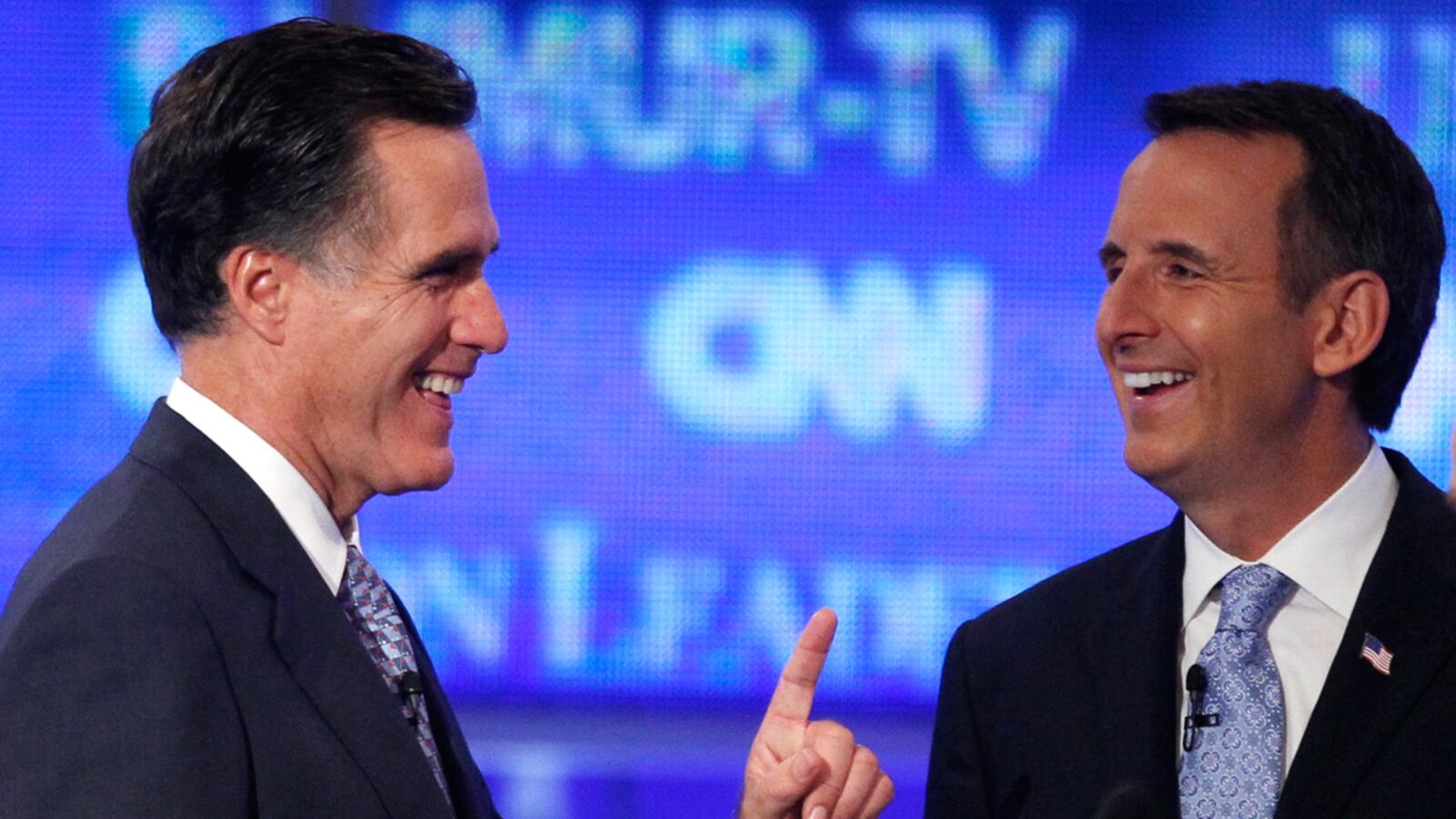Some surprises in the first New Hampshire GOP debate—Mitt Romney avoided taking fire as the front-runner and Michele Bachmann exceeded (admittedly low) expectations.
While GOP field is united on fiscal issues and predictably quick to declare President Obama a “failure,” there is open dissension on Bush doctrine-driven foreign policy. And when it comes to social issues, the religious right is determining the new normal in the Republican Party.
Among the night's revelations: leading candidates Romney and Pawlenty have formally joined the one-note social conservatives in supporting a federal marriage amendment to block same-sex marriages in the states (so much for the guiding principles of originalism and federalism).
Likewise, opposition to abortion even in cases of rape and incest is the new pro-life litmus test. To hear Michele Bachmann tell it, the founding fathers’ wrote the Declaration of Independence almost solely to illuminate the post Roe v. Wade world and victims of rape and incest are outliers who too often cloud the debate.
Of course, foreign policy is what occupies most presidents and it was striking to see the incoherence of the GOP field on this subject. Ron Paul gets points because of his consistency over the years. But after reflexively supporting the Bush doctrine, the rest of the current Republican crop seems confused because a Democratic president is pursuing its broad outlines. Mitt Romney’s tortured statement on Afghanistan was confused at best while Michele Bachmann managed to simultaneously criticize Obama for engaging in Libya and “leading from behind.” Partisanship is the enemy of moral clarity.

The big loser of the night was Newt Gingrich, who came into the debate with the least to lose, and therefore every incentive for swinging big. Instead, he tottered out in a yellow tie and despite a notably honest statement on immigration reform, he failed to make enough of an impression to change his Titanic narrative.
Speaking of missed opportunities, Tim Pawlenty decided to sidestep his pointed weekend attack on Romney’s health-care bill as “Obamneycare.” Even when prodded by CNN’s John King, he timidly back off the characterization. With a crucial second quarter fundraising number ahead of him, Pawlenty’s reluctance to punch hard (at least in the presence of his target) was a tail-tucking exercise. But he was not alone—virtually the entire stage declined to attack Romney on health care or the past litany of flip-flops.
Another figure was notable for their absence—and not Sarah Palin. Extensive genuflections to the sainted memory of Ronald Reagan has become standard in GOP debates—but not this time. It might be an oversight, but it also might be a sign of an emerging maturity in the Republican field that they are not looking solely back for self-definition.
The horserace approach to analysis is limited in a debate this early in the campaign season, but broad thematic outlines are emerging. This is a GOP field deeply influenced by the Tea Party movement for better and for worse. Thankfully, the more extreme examples of Obama Derangement Syndrome have faded, at least in part because they are so definitively un-presidential and losing their audience. Independent voters are, as yet, unrepresented in the GOP debates—even in 42 percent independent New Hampshire.
But it is clear that there is a multi-tiered approach to running for president which is becoming institutionalized. There are candidates who run to advocate ideas; there are those who run for self-promotion, and finally there are those who run for president. Serious presidential contenders were in the distinct minority on the stage at St. Anselm’s College Monday night—the ideologues and self-promoters are dominating the GOP consideration set. And while that can make for an entertaining debate, it is a bad sign in terms of the long-term health of our democracy.
John Avlon's new book Wingnuts: How the Lunatic Fringe Is Hijacking America is available now by Beast Books both on the Web and in paperback. He is also the author of Independent Nation: How Centrists Can Change American Politics and a CNN contributor. Previously, he served as chief speechwriter for New York City Mayor Rudy Giuliani and was a columnist and associate editor for The New York Sun.






